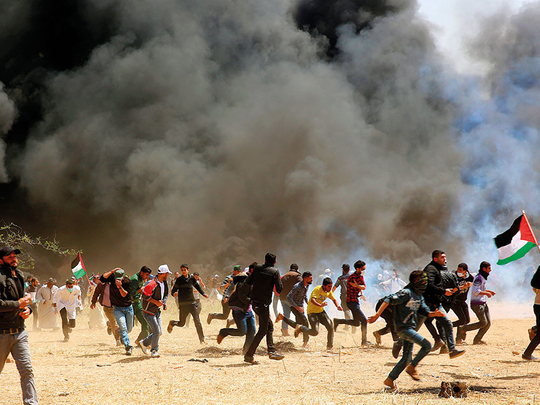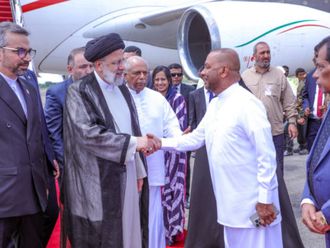
Dubai: The Arab Summit in Dammam, Saudi Arabia on Sunday is unlikely to be different from previous meetings.
However, the timing is significant, as it comes when Palestine has become a seething cauldron due to American and Israeli manoeuvres. The summit also coincides with internal conflicts in several Arab countries.
The Palestinian cause and the situation in Syria, Yemen and Libya are going to be high on the agenda at the Dammam’s summit, Arab political analysts said.
- Izz Al Arab | Political analyst
“I don’t think it (summit) will constitute a shift from previous summits for many reasons,” said Mohammad Izz Al Arab, a political analyst at the Cairo-based Al Ahram Strategic Studies Centre.
First, the challenges facing the structure of the Arab nation state remain, and have become even more acute, he told Gulf News. Now, “the question is how to preserve the existence of the state rather than achieving unity among the member countries of the Arab league,” Al Arab said.
The second reason is linked to threats to Arab League member states emanating from other Arab countries, such as those posed by Qatar to Egypt, and the threats both Algeria and Morocco pose to each other.
“It is clear the unresolved issues between Arab countries still constitute a threat (to other countries),” he said.
The interference of regional powers, namely Iran and Turkey, in the internal affairs of some Arab countries, including Lebanon, Yemen and Syria, is being seen as another challenge facing Arab states. At the same time, the influence of the superpowers is “doubling the destabilising factors, rather than stabilising the situation”. The US and Russian role in Syria, for instance, is further fueling tensions in the Arab region, analysts said.
“All these factors make the Dammam summit less effective in meeting the interests of the Arab countries, which differ from one country to another,” Al Arab said.
Sunday’s Arab summit, the 29th such meeting, will have a wide participation from the Arab leaders, a spokesperson of the Arab league was quoted as saying earlier.
It is the first summit since last June when the Arab Quartet – composed of the UAE, Saudi Arabia, Bahrain and Egypt – started a boycott of Qatar for Doha’s support for entities and groups listed as terrorist organisations in many parts Arab states. The four countries cut their diplomatic ties with Qatar because of its policies.
Qatari Emir, Shaikh Tamim Al Thani was invited to the summit and he said he will head his country’s delegation to the summit.
The Arab summit is also the first high level Arab meeting since last December’s announcement by US President Donald Trump to move the US embassy from Tel Aviv to occupied Jerusalem, which he also acknowledged as Israel’s capital, in a move that was rejected by the vast majority of the international community.
“The summit is expected to reaffirm the position vis-a-viz the Palestinian question ... [and] increase financial support for the Palestinians,” said Jihad Harb, a West Bank-based Palestinian political scientist and columnist.
Even the final communique is expected to reflect Arab support for Palestinians.
By paying considerable attention to the issue of occupied East Jerusalem and to the Palestinian cause as a whole, the summit will show that the city is still a “core issue” for the Arabs and that it cannot be shelved or ignored, he told Gulf News. Decisions supporting the Palestinians in their struggle for independence are expected to be taken.
For their part, the Palestinians are putting more emphasis on their own efforts to derail the “deal of the century”, which Trump said he will announce as part of his plan to end the Palestinain-Israeli conflict, said Harb. From what is being leaked to the press, the deal offers far less than the minimum acceptable conditions to the Palestinians.
The summit is likely to take some measures to end the conflict in Yemen, where Saudi Arabia is leading an Arab coalition fighting to uphold the legitimacy of the internationally recognised government of Yemeni President Abd Rabbo Mansour Hadi against the Iran-supported Al Houthi militia.
The ongoing war in Syria is probably going to get more attention.
Arabs seek peace and stability, said Jeddah-based political analyst Khaled Al Maeena.
The “Arab world is fragmented,” he told Gulf News. “You can’t have half of the Arab world dying daily, because this is going to affect the other half,” he said about the continuous fighting in Iraq, Syria, Libya and Yemen.
Some reports said the Qatar crisis will not be discussed, as it is considered a minor issue compared to other problems in the Arab region.
Al Maeena said, “GCC citizens want this crisis to be over … we truly hope that the Arab world and the Arab leaders will have peace and stability. We do hope that some kind of common grounds will be established in this summit,” he said.
However, Izz Al Arab said if the summit is not going to discuss the issue, this does not mean it is over.
“We can’t say it is over for more than one reason, including the fact that Qatari crisis was not dealt with through Arab regional organisations, such as the Arab League, but by the four [boycotting] Arab countries.”
“The issue of Qatar is similar to the American embargo against Cuba [which started in 1958 and lasted until 2016]. We are talking about a boycott that will go on for decades, not months or years,” Al Arab said.
Initially, the Arab meeting was scheduled for late March, before it was postponed because of the Egyptian presidential elections.












